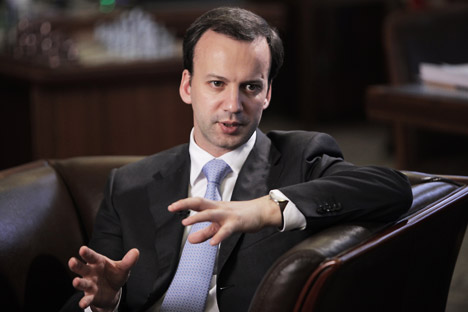Who is Mr. Dvorkovich?

Deputy Prime Minister Arkady Dvorkovich. Source: RIA Novosti / Andrey Stetin
Not everyone in the Russian business community applauded the decision to appoint liberal Arkady Dvorkovich as deputy prime minister responsible for the real economy – many thought he was not competent in the real sector, having dealt almost exclusively with macroeconomics, although others cited his long career in government as indicators of his future success. In his new post, Dvorkovich has responsibility for the entire manufacturing sector (except defense), fuel and energy, transport, communications, agriculture and natural resources.
Dvorkovich graduated from a math-intensive high school in Moscow in 1989 and continued his studies in the Faculty of Economics at Moscow State University (MGU). In 1994, Dvorkovich received his M.A. in Economics from the New Economic School. He then joined the Finance Ministry, working with a team that developed macroeconomic reforms. Eventually, Dvorkovich became the general director and head of research on the team. Dvorkovich also received a Master’s degree from Duke University in the United States.
In 2000, Dvorkovich co-authored “Russia’s Economic Strategy for the First Decade of the 21st Century,” drafted under the auspices of the Liberal Mission foundation led by Yegor Gaidar and Yevgeny Yasin. Also in 2000, Dvorkovich joined the Center for Strategic Studies, headed by German Gref. When Gref became minister for economic development and trade, Dvorkovich became his assistant and, later, his deputy. In the ministry, Dvorkovich supervised the macroeconomic analysis and finance department, the banking office in the investment policy department, and worked on the team responsible for drawing up Russia’s development strategy for the period up to 2010.
In 2004, during Putin’s second term, Dvorkovich led the presidential expert group coordinating national legislative projects. When Dmitry Medvedev became president in 2008, Dvorkovich became one of the very few members of Putin’s team to move into the new administration. Medvedev appointed Dvorkovich one of his seven aides, a representative at the G8, member of the modernization and technical development commission and of the groups supervising anti-corruption efforts, implementation of priority projects and the country’s demographic policy. Dvorkovich also became a member of Rosatom’s supervisory board.
Dvorkovich calls Yegor Gaidar, the economic reformer of the 1990s, his mentor. His economic credo is “Less state!” Dvorkovich was the chief lobbyist in Russia’s WTO accession campaign, an increase in the retirement age and the rapid privatization of the assets that remain state-owned.
Dvorkovich has a natural balance of pessimism and optimism and his liberal ideas are offset by his statist views. During the crisis, Dvorkovich called on leading businessmen not to seek help from the state, saying: “You have to work more responsibly and more efficiently.”
Dvorkovich’s critics have blamed him for some of Dmitry Medvedev’s most audacious initiatives, including the reduction in the number of time zones; the renaming of the police and the drive to abolish regular car inspections, which have nevertheless been retained and become more expensive. His supporters, on the other hand, call him one of Russia’s most promising politicians, a stronghold of liberalism. They credit him with working out an effective strategy for addressing the crisis and liberalizing the economy and the economic block of the Criminal Offenses Code. Dvorkovich’s success may depend on his ability to balance the expectations of both groups.
The article is abridged from the original Russian, which was first published in the magazine Itogi.
All rights reserved by Rossiyskaya Gazeta.
Subscribe
to our newsletter!
Get the week's best stories straight to your inbox